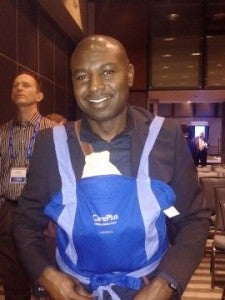Energy and enthusiasm abounded at the Global Maternal Newborn Health Conference in Mexico City in October 2015, where knowledge and evidence were shared, discussions were inspired, new innovations were demonstrated and networks extended. Less than a month after the Sustainable Development Goals (SDGs) were agreed by countries at the United Nations, this conference brought together both maternal and newborn health experts enthused by the need for integration and cross-sector cooperation – ways of working that are essential to meet SDG targets. It was a true global conference, bringing together researchers, practitioners, advocates and policy makers, from around the world for three packed days of plenary and panel sessions, posters, skills demonstrations, a marketplace of ideas and auxiliary sessions and meetings.
IDEAS at the conference: scaling up maternal and newborn health innovations

The IDEAS team was well-represented at the conference, taking part in two panel sessions. In one session, Dr. Neil Spicer presented ‘Catalysing scale-up of maternal and newborn child health innovations: A qualitative study in Ethiopia, Uttar Pradesh, India and Northeast Nigeria’. He described findings from two rounds of data collection, comprising over 200 semi-structured interviews, conducted in all three geographies, to explore the key actions that catalyse the scale up of innovations and identify the contextual factors enabling or inhibiting scale up. Dr. Spicer has also written an article ‘Scaling-up is a craft not a science’ based on the first round of data collection on the scale up of innovations.
IDEAS at the conference: using district level data for health decision-making
In a simultaneous panel session, six IDEAS researchers presented findings from a number of studies under the title ‘District decision-making for health in low- and middle-income countries: Assessing the feasibility of a data-informed platform for health through multi-country studies’, moderated by Dr Joanna Schellenberg:
- Dr. Bilal Avan set out the rationale and framework for a data-based structured decision-making process.
- Deepthi Wickremasinghe described the findings of a systematic literature review which found examples of good practice in decision-making for health at district level but no guidelines for decision-making processes.
- Dr. Sanghita Bhattacharyya described how data are currently used at district-level in India for health decisions, before going on to look at the findings of a content analysis of inter-sectoral district-level health data in Uttar Pradesh. This analysis and the results of a similar analysis carried out using Ethiopia district-level health data, which were presented by Dr. Della Berhanu, show that many health data are available, but data collection needs streamlining.
- Dr. Nasir Umar then explained the challenges to using health data for Local Government Area decisions during a time of insurgency in Gombe State, Northeast Nigeria.
- Dr. Meenakshi Gautham described the willingness of the private sector in India to share health data. Although the feasibility of a Data-Informed Platform for Health in Nigeria, Ethiopia and India faces various contextual challenges, pilot work has started in India.
What key speakers said: tell people about progress and integrate with other sectors
During the conference, the success of the Millennium Development Goals was feted, particularly the great strides that have been taken towards reducing the number of mothers and newborns who die of preventable causes. Plenary sessions were based on three key themes; quality, equity and integration of care.
Melinda Gates spoke about how life for a young woman in Malawi had changed, compared with the life of her mother. This young woman could choose to stay in a mothers’ home before the birth of her first child, learn parenting skills, have a skilled birth attendant in an equipped delivery room, and receive the vaccinations for herself and her baby.
Dr. Hans Rosling talked about how public understanding, particularly in high-income countries, of poverty and health measures around the world is about 20-30 years out of date, and that the impact of innovations needs to be communicated better so that people’s perceptions catch up with reality of progress made.
Dr. Joy Lawn, Professor of Epidemiology and Director of the Maternal, Adolescent, Reproductive and Child Health Centre at the London School of Hygiene & Tropical Medicine, described integration as the process of making whole, to overcome disintegration. She said that the biggest barrier to the integration of maternal and newborn health care is the global community, which is forced to think and do things differently because of the SDGs. She saw effective integration as both an opportunity and a challenge, and suggested that two starting points were to communicate more clearly about what is needed from other sectors to improve maternal and newborn health and to start interacting with ‘un-likeminded people’ from those sectors.
Lasting impressions
The lessons from our work on catalysing scale-up of maternal and newborn health innovations could easily be applied to other sectors to encourage cross-sector learning and the data-informed platform for health will aim to be multi-purpose benefiting officials making decisions on resources not only for health, but also for other sectors.
As the IDEAS project’s results continue to emerge over the coming year, the messages of integration and cross-sectoral cooperation to achieve the SDGs will be in the forefront of our minds.
This post has been lightly edited from its original posting on the blog of the IDEAS project at the London School of Hygiene and Tropical Medicine.

